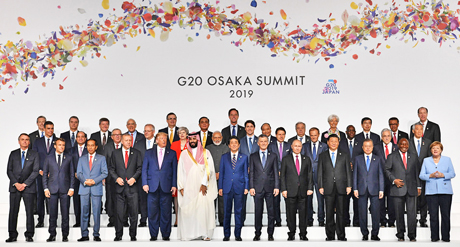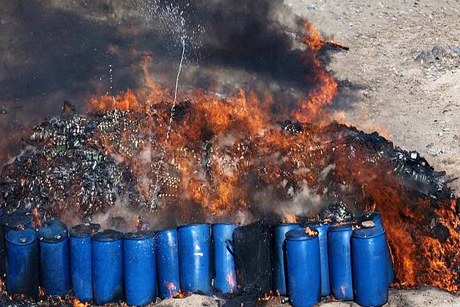In the News

OSAKA, Japan — The annual G20 summit of leaders from the largest and fastest-growing economies, got underway last Friday in Osaka, Japan, against a backdrop of what UN Secretary-General António Guterres described as “a moment of high political tension”.
“We have global warming, but we have also global political warming, and this can be seen in relation to trade and technology conflicts, it can be seen in relation to situations in several parts of the world, namely the Gulf”, he told reporters before addressing the summit, referring to recent attacks on oil tankers around the Strait of Hormuz and the Gulf of Oman, which have heightened tensions between Iran and the United States.
Turning to “uncertainties about the global economy”, he pointed to trade conflicts, high debt levels, potentially unstable financial markets and the risk of global growth slowdown.
In the UN chief’s view, it “will be very difficult to have a breakthrough in relation to some of the most difficult challenges that the international community is facing”.
Rescue the planet
The secretary-general spotlighted the urgency of addressing climate change as a main priority.
Painting a picture of “heat waves in Europe, drought in Africa, storms happening also in Africa and the Caribbean” and a “multiplication” more intense, more frequent natural disasters “with worsening humanitarian consequences” he repeated his passionate refrain that “climate change is running faster than what we are”.
“All the analyses that can be made show the situation, in practical terms, is worse than what we could have forecasted, and the political will has been failing”, he said, calling it “a paradox that needs to be addressed”.
Avowing his belief in climate science, Guterres cited the landmark Intergovernmental Panel on Climate Change (IPCC) report of last October, which spells out that by the end of the 21st Century, temperatures must not exceed 1.5 degrees Celsius above pre-industrial levels.
This necessitates the world reaching carbon neutrality by 2050, which requires more ambition by governments and others.
He spoke about the UN’s September Climate Action Summit in New York where he will appeal to world leaders for a stronger commitment for climate action, including by “putting a price on carbon, ending subsidies to fossil fuels, [and] not accepting the idea that we still have an acceleration of the construction of coal power plants”, all of which are “absolutely essential to rescue the planet”.
2030 Agenda
The 2030 Agenda for Sustainable Development is another main challenge where “we are lagging behind”, according to the UN chief.
“If we project the different Sustainable Development Goals (SDGs), the evolution since the beginning until now to 2030, we will be more or less at midway of what the international community has determined when the Agenda 2030 was approved”, he said, arguing the need to accelerate resource mobilization. “Countries need to do more, mobilizing their own internal resources, improving their governance, reducing corruption, implementing the rule of law”.
Guterres highlighted that G20 nations represent 80 per cent of climate change emissions and appealed for a stronger commitment to international financial and economic cooperation.
Iran, China, US and the digital economy
After delivering his prepared text, the UN chief took questions on a variety of subjects, including rising tensions between the United States and Iran, where he reiterated his support for the Joint Comprehensive Plan of Action (JCPOA), commonly known as the Iran nuclear deal.
“I have always believed and will go on believing that the JCPOA is a very important instrument…and it was a factor of stability, and that it will be very important to preserve it”, he stated. “Obviously, it is essential to de-escalate the situation in the Gulf” to avoid a confrontation that “the world couldn’t afford”.
When asked to what extent the UN chief held president Trump responsible for disagreements among the G20 leaders, he stressed the importance of dialogue between the presidents of China and the US, saying theirs was “probably the most relevant bilateral meeting that will take place”.
On the digital economy, the UN chief spoke of the recently concluded high-level panel on the digital cooperation, noting the “huge impact” that it, along with artificial intelligence, will have on the global economy.
“We will see a massive destruction of jobs and the massive creation of jobs, but the jobs will be different,” he said, adding that there must be “a strong commitment” by countries to guarantee the education, social protection and job creation needed to “minimize the negative impacts” and “optimize the positive contributions of the fourth industrial revolution”.

NEW YORK, USA – A study from the UN Office on Drugs and Crime (UNODC) shows that the negative health consequences associated with drugs are more severe and widespread than previously thought, with around 35 million people suffering from drug use disorders and requiring treatment services.
Higher figures attributed to improved research and data
Some 11 million people injected drugs in 2017, 1.4 million of whom are living with HIV, and 5.6 million with hepatitis C. UNODC explains the significantly higher figures are due in part to improved research and more precise data, including more knowledge of the extent of drug use from new surveys conducted in India and Nigeria, two of the most populous countries in the world.
“The findings of this year’s World Drug Report fill in and further complicate the global picture of drug challenges, underscoring the need for broader international cooperation to advance balanced and integrated health and criminal justice responses to supply and demand”, said Yury Fedotov, UNODC Executive Director, in a statement.
Overall rising trend in drug use, cocaine production
at an all-time high
Whilst the overall figure for drug use in 2017, an estimated 271 million people, was similar to the previous year, the trend is rising, and the number of people using drugs is now some 30 per cent higher than it was ten years ago.
This is partly attributed to a 10 percent increase in the global population aged 15-64, but also increased opioid use in Africa, Asia, Europe and North America, as well as higher cannabis consumption in North and South America, and Asia. Opiods are the class of illegal drugs derived from heroin, opium poppies, including synthetics such as fentanyl, and other prescription medications such as Oxycontin and Vicodin.
The manufacture of cocaine, chiefly from South America, reached an all-time high in 2017, with an estimated production of 2,000 tons in 2017, up by a quarter on the previous year. At the same time, seizures of cocaine rose 13 per cent to 1,275 tons, another record figure.
Synthetic opioid misuse, centred around Fentanyl and similar drugs, is an ongoing crisis in the US and Canada, with over 51,000 overdoses reported in 2017. Countries in West, Central and North Africa are experiencing an opioid crisis surrounding another drug, Tramadol, which has flooded the market in recent years: seizures of Tramadol jumped from less than 10 kilograms in 2010 to around 125 tons in 2017.
Only one in seven receive treatment
Not enough people with drug disorders are being adequately treated, with the study showing that just one in seven people with disorders are getting the help they need. Effective treatments, based on scientific evidence and in line with international human rights obligations, are not as available or accessible as they need to be, the report states. It calls on national governments and the international community to step up interventions in order to address this gap.
A meeting was held recently at UN headquarters in New York to launch the annual study, where a ceremony to mark the 2019 International Day against Drug Abuse and Illicit Trafficking under the theme “health for justice, justice for health”, also took place.
Referring to the wide-ranging impacts that the worldwide drug problem has on the “health and well-being of families and communities, as well as on the security and sustainable development of nations”, UN chief António Guterres welcomed the 2019 theme, and called on all governments to live up to a pledge made earlier this year to work together to come up with responses, including cracking down on drug trafficking and those who profit from human misery that allow people to live in “health, dignity and peace, with security and prosperity”.
To advertise in ICW call
Call 905-738-5005